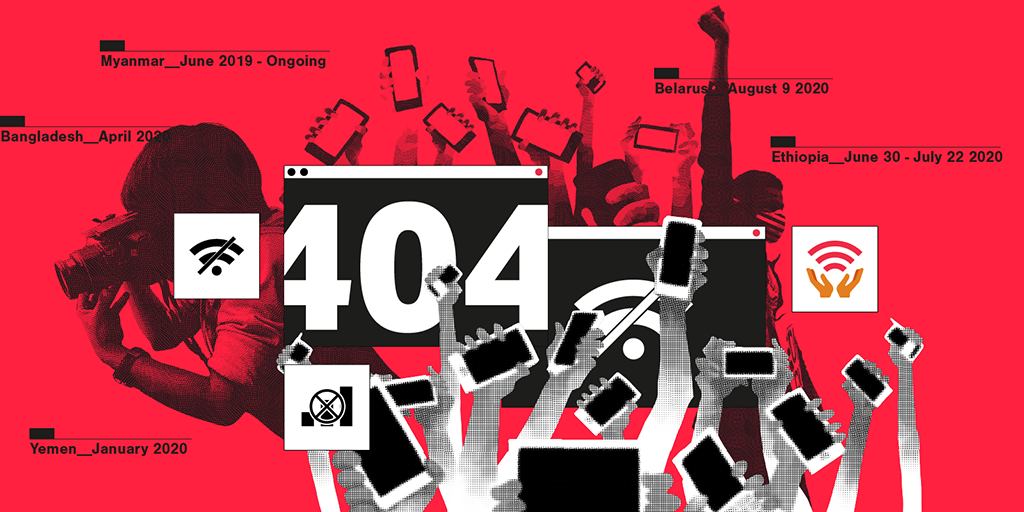Update: February 4, 2021 — As the #FarmersProtest across India continues to grow, the wave of online censorship has accelerated across the country. Government-mandated internet shutdowns have expanded further, and mobile internet and SMS has been targeted in an attempt to block protester communication. The Internet has not been fully restored in most areas that were initially cut off on January 26, and the shutdowns in at least two districts have reportedly been extended until at least tomorrow, February 5. As more protests are announced, including a national demonstration to occupy roads on February 6, it is unclear when and where the internet will be blocked.
The government of India also ordered Twitter to block the accounts of hundreds of users, many associated with the farmers’ protests, and several specific hashtags.
“The issuance of confidential web content blocking orders which seek the censorship of entire hashtags and blocking of the handles of news magazines is unlawful under international human rights law and unacceptable in the world’s largest democracy,” said Raman Jit Singh Chima, Senior International Counsel and Asia Pacific Policy Director at Access Now
It appears the tech giant initially complied to the censorship order issued under Section 69A of the Indian Information Technology Act without pushback, but lifted it shortly after. The government has reportedly sent Twitter a notice, threatening legal action over non-compliance.
“If a company like Twitter receives government requests to block services, they have a responsibility to review their legality and disproportionality,” said Felicia Anthonio, Campaigner and #KeepItOnLead at Access Now. “If these platforms have no option but to comply with shutdown orders, they should do so under protest, seek legal action, and fight every step of the way to uphold the human rights of the millions of people who use them every day.”
International organizations, other governments, Greta Thurberg, and Rihanna have raised concern over the protests, and subsequent internet shutdowns.
The massive Govt-Twitter tug of war. IFF Chairperson Raman Chima (@tame_wildcard) shares his views on this
Watch #NewsTrack with @rahulkanwal LIVE pic.twitter.com/gA8eYXDdbW— IndiaToday (@IndiaToday) February 4, 2021
January 26, 2021 — India’s Union Ministry of Home Affairs has issued orders directing internet shutdowns across several areas of the National Capital Territory (NCT) of Delhi today, January 26, the nation’s Republic Day.
Reports of disrupted internet and telecom connectivity emerged earlier today as the Delhi Police clashed with farming groups taking part in a planned protest in Delhi. People in several parts of the city received messages from telecom providers stating that services had been disrupted following government orders. The directive issued by the Union Ministry of Home Affairs under provisions of the 2017 Telecom Network Suspension Rules ordered internet suspension in the Singhu, Ghazipur, Tikri, Mukarba Chowk, and Nangloi areas of the NCT of Delhi, from 12:00 to 23:59 local time on January 26. The order was apparently issued at the behest of Delhi Police, which functions as a federal police force, reporting to the Union Government and not the government of the NCT of Delhi.
“The Union Government must stop using internet shutdowns as its go-to tool to quell political protests and demonstrations,” said Raman Jit Singh Chima, Senior International Counsel and Asia Pacific Policy Director at Access Now. “On India’s Republic Day, the government-ordered internet shutdown affecting hundreds of thousands of people in these areas of Delhi is not just inconsistent with a 21st Century Digital India, it directly violates the Constitution of India which the day seeks to celebrate.”
India has a long track record of internet shutdowns, often in response to protests, but historically avoided implementing them in the capital until December 2019, when the Union Government ordered the disruption and suspension of internet services as protestors gathered to peacefully demonstrate against the controversial, discriminatory Citizenship Amendment Act (CAA) and proposed National Population Registry. Internet shutdowns are now regularly ordered across several parts of the Indian republic, and India has been topping the global list of countries ordering internet shutdowns.
“Cutting internet access prevents ground-level reporting and the sharing of information, harming freedom of press, and preventing others from reporting and documenting those committing violence” said Felicia Anthonio, Campaigner and #KeepItOn Lead at Access Now. “It also blocks everyday people from communicating when they need to most, often causing more stress and confusion.”
